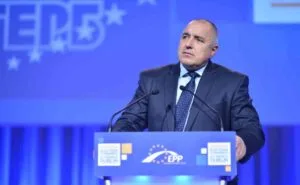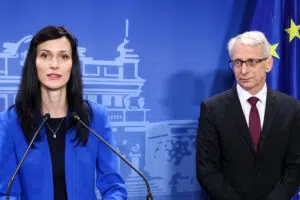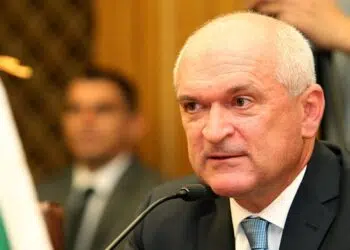Brussels – While all of Europe’s attention was focused on the outcome of the elections to renew the European Parliament, Bulgaria returned yesterday (June 9) to early voting for the umpteenth time, the sixth in three years. Despite some downturns, the overall picture of the political balance is not suffering too heavy a blow, and this is not necessarily good news, given the difficulty in finding agreements in the National Assembly to create a majority solid enough to last more than a few months.
With the vote counting now up to 85 per cent of the total, the conservative Gerb (Citizens for the European Development of Bulgaria) party of ex-premier Boyko Borissov, which claimed victory at the polls already in the evening despite a slight drop from the previous round in April 2023 (-1.7 per cent), is confirmed as the first force. On the other hand, the Liberals of We Continue the Change – Democratic Bulgaria (-8) plummeted to 14.54 per cent, suffering from the plug pulled from the coalition government with Gerb in the spring, just at the moment of the hand-over of the executive’s lead from Nikolai Denkov to former European Commissioner Mariya Gabriel. The liberals are being overtaken as the second force in the future parliament by the centrists of the Movement for Rights and Freedoms (DPS, of the Alde family of European liberals) with 15.34 per cent. At the same time, the pro-Russian and anti-EU far-right of Vazrazhdane (Rebirth) has not gained strength, still at around 13.5 per cent of the vote as a year ago. The downward trend of the Bulgarian Socialist Party (BSP) continues at 6.76 per cent, its worst result ever, while the populists of There’s Such a People (ITN) regain some vigour with 5.94 per cent (+2).

At this point, however, a majority in the National Assembly has to be built to reach at least the minimum quota of 121 seats (out of 240) to obtain the majority that will support the future executive. And this is ultimately the real stumbling block in the most unstable country in the entire European Union in the past three years. While current affairs will be handled by the interim Premier Dimităr Glavčev, the President of the Republic, Rumen Radev, will give Gerb the first mandate to attempt to reach an agreement in parliament, presumably with the DPS centrists, but, above all, it will be necessary to find a third coalition partner. It is unlikely to be the PP-DB liberals—because of the defeat at the polls and the recent rifts with the conservative party that joins the European People’s Party (EPP) family—while attention is once again focused on support (including external backing) from the populists of showman Slavi Trifonov.
Looking at the Bulgarian European results (the vote for the renewal of the National Assembly and the vote for the new EU Parliament were held in parallel on June 9), Gerb asserts itself as the leading delegation with 6 MEPs, keeping the number of its members in the EPP group stable despite the significant retreat in percentage from five years ago (from 31.07 to 22.94). The Bulgarian Liberal delegation in the Renew Europe group increases to 5 members—with DPS remaining stable with 3, plus PP-DB’s two new members—while the Socialists halve (from 4 to 2) and the Bulgarian National Movement (VMRO) nationalists disappear from the European Conservatives and Reformists (ECR) group. Instead, the three new ultranationalist and pro-Russian Vazrazhdane MEPs and the only elected member of the ITN populists will have to find a political home in the EU Parliament.
Three years of political instability in Bulgaria
With the government agreement between Gerb and We Continue the Change in May 2023, the political instability that led the country to hold five elections in exactly two years seemed to be over. It all started with the outcome of the polls on April 4, 2021, when the conservatives were confirmed as the leading force, but in an extremely fragmented political landscape: after three months of failed negotiations to form an executive, President Radev had decided on an early return to the polls. Anti-system propaganda had rewarded the populist movement There’s Such a People, founded by showman Trifonov in the July 11 elections. After another four months of unsuccessful negotiations between the parties, President Radev was forced to call for early elections in November of that year.

On November 14, 2021, a quarter of preferences were for the anti-corruption We Continue the Change party, bypassing Gerb’s conservatives and relegating Trifonov’s populists to the shadows. With the support of these two forces, Kiril Petkov was appointed premier for the first time, with a sense of stability and planning for the country’s future. Under his leadership, talks with North Macedonia were pursued to overcome the identity dispute blocking the opening of negotiations for Skopje’s accession to the EU since December 2020. It was precisely this effort that was fatal to Petkov, although it did not prevent him from bringing the revocation of veto to fruition: first, Trifonov’s party switched to the opposition and then, on June 22, 2022, the government was defied with a motion filed by Gerb.
After a round of inconclusive consultations, it was back to voting in October, with the former prime minister Borissov’s new first place but the usual inability to reach a governing agreement between the parties. The last April 2, 2023 elections confirmed the now chronic political gridlock: the two most established formations paired around 25 per cent of the vote with the pro-Russian and anti-European nationalists of Vazrazhdane on the rise. This is also why the most experienced politician at the European level has been called and—despite the great difficulty in reaching an agreement between the first and second political forces—the risk of sliding into pro-Russian and anti-European chaos at the new elections convinced both parties to accept a compromise, represented precisely by the alternation to the office of premier and vice-premier over 18 months of government. With the swearing-in of the new government on June 6, 2023, Denkov immediately took over the role of prime minister and Gabriel, that of deputy prime minister and foreign minister, which they were to exchange in the sprin# before the sudden collapse and the new return to the polls.
English version by the Translation Service of Withub






